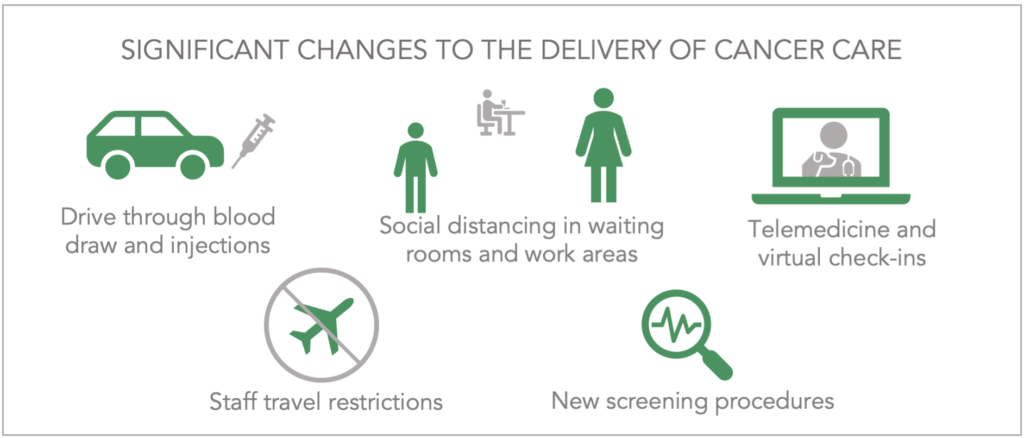COVID-19 has compelled oncology practices to hit the “reset” button for their whole care delivery model. Community Oncology Alliance recently assembled a panel of community cancer practices for a webinar, “The Impact of COVID-19 on Oncology Practices and How They Are Adjusting.”
The panel represented community practices across the country:
- Northwest Medical Specialties, Tacoma, WA (presentation)
- Hematology-Oncology Associates of Central New York (presentation)
- Oncology Consultants, Houston, TX (presentation)
- Cancer & Hematology Centers of Western Michigan (presentation)
- Michiana Hematology Oncology, Northern Indiana
New Normal for the Deliver of Cancer Care
There were several logistical changes that were common across the practices as they work to protect their patients:

- New screening procedures prior to entering the clinic
- Changes in visitor policies – most no longer allowing any
- Redesign of waiting rooms and work areas to enable social distancing
- Use of virtual check-ins and telemedicine when possible
- Drive through testing and injections
- Travel restrictions for staff
- Division of “sick” or isolated clinic areas and “safe” clinic areas
Changing the Way Cancer Care Teams Work
Beyond physical logistics and changes, many of the presenters shared how they are paying attention to mental health for staff and patients. They have a new emphasis on communication and transparency. The situation is changing rapidly and keeping the lines of communication open can help alleviate some of the fear surrounding the pandemic.
As practices face equipment and testing shortages they shared what they are doing. One presenter said her practice is testing symptomatic patients for the flu before COVID-19 due to testing shortages. Another said they were able to dig up old infusion computers to repurpose for telehealth virtual visits.
There were also creative methods for staffing, not only allowing those who can to work remotely, but other models like creating two teams of APPs – one to manage administrative work from home and one to manage patient care in the clinic. This has limited exposure – if an on-site member does get exposed, they can move to the remote team.
Community cancer providers are managing a lot amidst the COVID-19 pandemic. Beyond safety and health concerns, there is concern about staying financially viable as millions of Americans find themselves unemployed and potentially uninsured during this crisis. Telemedicine, while a great tool in the current crisis does have limitations and can be inaccessible for low technology patients. And, ultimately, they are trying to treat cancer, not COVID-19, and this is adding significant strain to an already challenging landscape.
Dedication and Adaptability
Our country’s cancer care providers are doing amazing things under extremely difficult circumstances – all the speakers shared the appreciation they have for their teams who are coming to work everyday ready to help however they can and adjusting to the new normal without complaint. One presenting described the atmosphere at her practice: positive, cautious, preventative, supportive, flexible, empathetic.
About Navigating Cancer
Navigating Cancer is the leading Patient Relationship Management technology and solutions company focused on improving the patient experience, delivering more effective care management and enabling oncology care innovation. With over 1,700 providers adopting the Navigating Care platform, it is the most broadly deployed patient management solution in oncology.
The Navigating Care platform includes several important communication tools to remember during the COVID-19 pandemic. We can help you provide important information digitally to patients via:
- Health Tracker, an electronic patient-reported outcome program
- Home care instructions delivered directly to the patient following a triage phone call
- Portal banner messages to communicate timely information
- Batch secure messaging to reach specific patient populations with one message
- Customized patient education to share information specific to your practice
